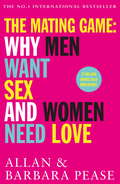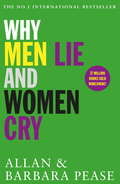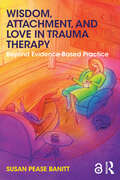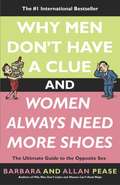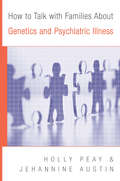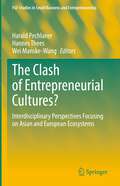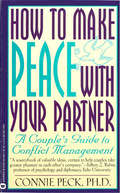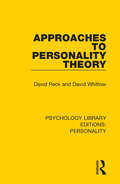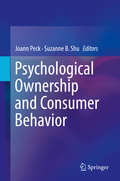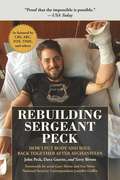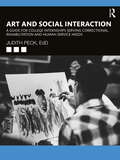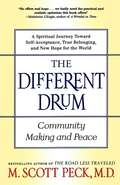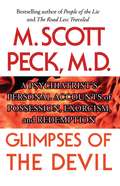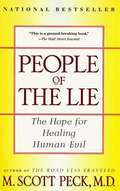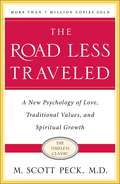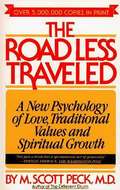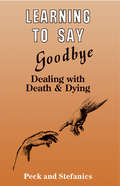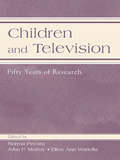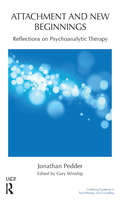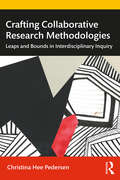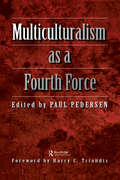- Table View
- List View
The Mating Game: Why Men Want Sex & Women Need Love
by Allan Pease Barbara PeaseInternational bestselling authors Allan and Barbara Pease (WHY MEN DON'T LISTEN AND WOMEN CAN'T READ MAPS) focus their insight and wit on the most popular, and some would maintain, important part of any relationship: sex. In their inimitable style they explore what men and women want from a sexual relationship and give humourous and practical advice. Discover:What men and women really want from love and sexHow to find a great partnerWhat to do when the chemistry is wrongHow to have a happy future with your partner
Why Men Don't Listen & Women Can't Read Maps: How to spot the differences in the way men & women think
by Allan Pease Barbara PeaseIn this classic international bestselling book, Allan and Barbara Pease highlight the differences in the ways men and women think.Barbara and Allan Pease travelled the world collating the dramatic findings of new research on the brain, investigating evolutionary biology, analysing psychologists research, studying social change and annoying the locals. The result is WHY MEN DON'T LISTEN AND WOMEN CAN'T READ MAPS, the sometimes shocking, always illuminating, frequently hilarious look at where the battle line is drawn between the sexes, why it was drawn and how to cross it. Revealed: Why men really can't do more than one thing at a time Why women make such a mess of parallel parking Why men should never lie to women Why women talk so much and men so little WHAT MEN AND WOMEN REALLY WANT A must-read for everyone - you will learn as much about yourself and how to improve your relationships, as you will about the opposite sex.
Why Men Lie & Women Cry: How to get what you want from life by asking
by Allan Pease Barbara PeaseThe authors of the international bestsellers WHY MEN DON'T LISTEN AND WOMEN CAN'T READ MAPS and THE DEFINTIVE BOOK OF BODY LANGUAGE teach strategies for happier, more fulfilled relationships.Allan and Barbara Pease are the world's foremost experts in personal relationships. Their books, seminars and TV programmes have made them household names from Australia to the UK and from the USA to Japan. In their follow-up to the multi-million selling WHY MEN DON'T LISTEN AND WOMEN CAN'T READ MAPS, Allan and Barbara use the same combination of startling observation of people's actions towards one another, humour and practical advice to teach the reader more about what men and women want from relationships, and how to get it.
Wisdom, Attachment, and Love in Trauma Therapy: Beyond Evidence-Based Practice
by Susan Pease BanittWisdom, Attachment, and Love in Trauma Therapy focuses on the creation of the therapist as healing presence rather than technique administrator—in other words, how to be rather than what to do. Trauma survivors need wise therapists who practice with the union of intellect, knowledge, and intuition. Through self-work, therapists can learn to embody healing qualities that foster an appropriate, corrective, and loving experience in treatment that transcends any technique. This book shows how Eastern wisdom teachings and Western psychotherapeutic modalities combine with modern theory to support a knowledgeable, compassionate, and wise therapist who is equipped to help even the most traumatized person heal.
Wisdom, Attachment, and Love in Trauma Therapy: Beyond Evidence-Based Practice
by Susan Pease BanittWisdom, Attachment, and Love in Trauma Therapy focuses on the creation of the therapist as healing presence rather than technique administrator—in other words, how to be rather than what to do. Trauma survivors need wise therapists who practice with the union of intellect, knowledge, and intuition. Through self-work, therapists can learn to embody healing qualities that foster an appropriate, corrective, and loving experience in treatment that transcends any technique. This book shows how Eastern wisdom teachings and Western psychotherapeutic modalities combine with modern theory to support a knowledgeable, compassionate, and wise therapist who is equipped to help even the most traumatized person heal. Chapters: Chapters 2 and 3 of this book are freely available as a downloadable Open Access PDF at http://www.taylorfrancis.com under a Creative Commons [Attribution-Non Commercial-No Derivatives (CC-BY-NC-ND)] 4.0 license.
Why Men Don't Have a Clue and Women Always Need More Shoes
by Barbara Pease Allan PeaseAn hilarious and perceptive look at the tactics of men and women from those consummate people-waters, Barbara and Allan Pease. Why are men clueless about romance, love and relationships? Why do they avoid making commitment? Why do men tell lies to women and think they can get away with it? On the other hand, why do women cry to get their own way with men and why do women insist on talking a subject to death? And why do women need more shoes instead of more sex? The gulf between the sexes, the misunderstandings and conflicts are still as present in our lives in the twenty-first century as they were when Adam first fell foul of Eve. Let Allan and Barbara Pease - the internationally renowned experts in human relations, communication and body language - help you transform the way in which you relate to the opposite sex.
How to Talk with Families About Genetics and Psychiatric Illness
by Holly Landrum Peay Jehannine Claire AustinAddressing clients' questions and concerns about the role of genetics in mental illness. As we learn more about how our biology and genes can play into the development of a mental health disorder, patients and their families are increasingly seeking answers to tough questions about common risk factors, the likelihood of recurrence, the need for genetic testing, and implications for future generations. A practical, go-to resource for all mental health clinicians, this guide explains just how to address these questions and concerns in a way that's comprehensible and compassionate. Filled with case studies, sample dialogues, and question-and-answer examples, it is an essential roadmap for practitioners, helping them to demystify a complex issue for their clients and equip them with the accurate, reassuring information they need.
The Clash of Entrepreneurial Cultures?: Interdisciplinary Perspectives Focusing on Asian and European Ecosystems (FGF Studies in Small Business and Entrepreneurship)
by Harald Pechlaner Hannes Thees Wei Manske-WangThis book uncovers the current knowledge on entrepreneurial cultures and the development of entrepreneurial ecosystems between Asia and Europe. Broadening the scope spatially and conceptually, the book discusses the entrepreneurial ecosystems as a system and mediator in their cultural, political, and socio-economic settings in an interdisciplinary approach. This allows a clearer perspective on stakeholders' interaction, international collaboration and competition, power relations, and political influence. The various chapters in this edited volume cover the peculiarities and differences in Asia, Europe, and Eurasia with the New Silk Road (or Belt and Road Initiative) as the bridging component. The chapters, written for researchers and policy makers interested in Asian-European cooperation, also include discussions on economic systems, globalization, and regionalization, politics, cultures, and digitalization.
How to Make Peace with Your Partner: A Couple's Guide to Conflict Management
by Connie PeckUse the skills of professional negotiators to solve everyday household issues.
Approaches to Personality Theory (Psychology Library Editions: Personality)
by David Peck David WhitlowOriginally published in 1975, this book reviews the major personality theories influential at the time, including those of Freud, Kelly, Cattell, and Eysenck, and presents the main assessment techniques associated with them. It also discusses their application in such fields as abnormal psychology, diagnosis, psychotherapy, education and criminology. The authors find none of the theories completely satisfactory, but pinpoint important successes and suggest a promising new approach.
Psychological Ownership and Consumer Behavior
by Joann Peck Suzanne B. ShuThis pathbreaking volume expands on the construct of psychological ownership, placing it in the contexts of both individual consumer behavior and the wider decision-making of consumer populations. An individual’s feeling of ownership toward a target represents the perception that something is “mine!”, and is highly relevant to buying and relating to specific goods, economic and health decision-making and, especially salient given today’s privacy concerns, psychological ownership of digital content and personal data. Experts analyze the social conditions and cognitive processes concerning shared consumer experiences and psychological ownership. Contributors also discuss possibilities for socially responsible forms of psychological ownership using examples from environmental causes, and the behavioral mechanisms involved when psychological ownership becomes problematic, as in cases of hoarding. Included among the topics: Evidence from young children suggesting that even legal ownership is fundamentally psychological. Ownership, the extended self, and the extended object. Psychological ownership in financial decisions. The intersection of ownership and design. Can consumers perceive collective psychological ownership of an organization? Whose experience is it, anyway? Psychological ownership and enjoyment of shared experiences. Psychological ownership as a facilitator of sustainable behaviors including stewardship. Future research avenues in psychological ownership. Psychological Ownership and Consumer Behavior pinpoints research topics and real-world issues that will define the field in the coming years. It will be especially useful in graduate classes in marketing, consumer behavior, policy interventions, and business psychology.
Rebuilding Sergeant Peck: How I Put Body and Soul Back Together After Afghanistan
by John Peck Dava Guerin Terry Bivens"Marine Sgt. John Peck is a survivor, but he is also a thriver. His story still makes me smile. I am so grateful that he entered our lives.”—Jennifer Griffin, FOX News Marine Sgt. John Peck survived an IED during the War on Terror that left him with a traumatic brain injury, amnesia, and cost him his marriage. He survived another three years later, one that left him with three and a half limbs missing. He’s one of only two living people to survive the flesh-eating fungus he contracted in recovery at Walter Reed, one that left him as a quadruple amputee. And that’s only the beginning of his story. What followed was a recovery nothing short of miraculous. With resilience and the help of advocates like actor and philanthropist Gary Sinise, FOX’s Jennifer Griffin, and Bill O’Reilly, John would use a specialized “Action Trackchair” wheelchair and a newly-built SmartHome to get a third lease on life. In 2016, Peck underwent a groundbreaking bilateral arm transplant, receiving two new arms. To date, the surgery has been successful. Today, Peck is a motivational speaker, a philanthropist for veteran and wounded warrior causes, and is pursuing his lifelong dream of becoming a chef with the help of Chef Robert Irvine. From the lessons learned in a difficult childhood and as a homeless teenager, to dealing with depression in recovery, to learning how to chop with another man’s arms, Rebuilding Sergeant Peck is Peck’s account of an honest, visceral, and inspirational story that is truly unique.
Art and Social Interaction: A Guide for College Internships Serving Correctional, Rehabilitation and Human Service Needs
by Judith PeckThis manual contains the information needed for human service institutions, liberal arts colleges, and community volunteers to present a program of creative visual arts in jails, psychiatric facilities, drug rehabilitation centres, nursing homes, shelters and facilities for youth in need. By engaging in one-on-one artistic interaction with the individuals served, students not only perform community service but gain unique personal understanding of the major domestic issues of our time—crime, mental illness, substance abuse, domestic abuse and aging. The covered activities are designed to stimulate memory, acknowledge experience and achievement, and improve self-esteem. Delivering everything needed to set up the course in any liberal arts college, the book offers approaches for diverse populations and covers planning and execution, aesthetic and humanistic objectives, projected outcomes, and methods of evaluation. Techniques are presented for drawing, painting, collage, sculpture and crafts. By adopting this manual, colleges with programs in art and social work, can provide students with education relevant to their lives and potential careers while providing a unique service to social service institutions.
The Different Drum: Community Making and Peace
by M. Scott Peck'The overall purpose of human communication is - or should be - reconciliation. It should ultimately serve to lower or remove the walls of misunderstanding which unduly separate us human beings, one from another...' Although we have developed the technology to make communication more efficent and to bring people closer together, we have failed to use it to build a true global community. Dr M. Scott Peck believes that if we are to prevent civilization destroying itself, we must urgently rebuild on all levels, local, national and international and that is the first step to spiritual survival. In this radical and challenging book, he describes how the communities work, how group action can be developed on the principles of tolerance and love, and how we can start to transform world society into a true community.
The Different Drum: Community Making and Peace
by M. Scott Peck'The overall purpose of human communication is - or should be - reconciliation. It should ultimately serve to lower or remove the walls of misunderstanding which unduly separate us human beings, one from another...' Although we have developed the technology to make communication more efficent and to bring people closer together, we have failed to use it to build a true global community. Dr M. Scott Peck believes that if we are to prevent civilization destroying itself, we must urgently rebuild on all levels, local, national and international and that is the first step to spiritual survival. In this radical and challenging book, he describes how the communities work, how group action can be developed on the principles of tolerance and love, and how we can start to transform world society into a true community.
The Different Drum: Community Making and Peace
by M. Scott PeckThe overall purpose of human communication is - or should be - reconciliation. It should ultimately serve to lower or remove the walls of misunderstanding which unduly separate us human beings, one from another... Although we have developed the technology to make communication more efficient and to bring people closer together, we have failed to use it to build a true global community. Dr M. Scott Peck believes that if we are to prevent civilization destroying itself, we must urgently rebuild on all levels, local, national and international and that is the first step to spiritual survival. In this radical and challenging book, he describes how the communities work, how group action can be developed on the principles of tolerance and love, and how we can start to transform world society into a true community.
Glimpses of the Devil: A Psychiatrist's Personal Accounts of Possession, Exorcism, and Redemption
by M. Scott PeckThe legendary bestselling author and renowned psychiatrist M. Scott Peck, whose books have sold over 14 million copies, reveals the amazing true story of his work as an exorcist -- kept secret for more than twenty-five years -- in two profoundly human stories of satanic possession. In the tradition of his million-copy bestseller People of the Lie: The Hope for Healing Human Evil, Scott Peck's new book offers the first complete account of exorcism and possession by a modern psychiatrist in this extraordinary personal narrative of his efforts to heal patients suffering from demonic and satanic possession. For the first time, Dr. Peck discusses his experience in conducting exorcisms, sharing the spellbinding details of his two major cases: one a moving testament to his healing abilities, and the other a perilous and ultimately unsuccessful struggle against darkness and evil. Twenty-seven-year-old Jersey was of average intelligence; a caring and devoted wife and mother to her husband and two young daughters, she had no history of mental illness. Beccah, in her mid-forties and with a superior intellect, had suffered from profound depression throughout her life, choosing to remain in an abusive relationship with her husband, one dominated by distrust and greed. Until the day Dr. Peck first met the young woman called Jersey, he did not believe in the devil. In fact, as a mature, highly experienced psychiatrist, he expected that this case would resolve his ongoing effort to prove to himself, as scientifically as possible, that there were absolutely no grounds for such beliefs. Yet what he discovered could not be explained away simply as madness or by any standard clinical diagnosis. Through a series of unanticipated events, Dr. Peck found himself thrust into the role of exorcist, and his desire to treat and help Jersey led him down a path of blurred boundaries between science and religion. Once there, he came face-to-face with deeply entrenched evil and ultimately witnessed the overwhelming healing power of love. In Glimpses of the Devil, Dr. Peck's celebrated gift for integrating psychiatry and religion is demonstrated yet again as he recounts his journey from skepticism to eventual acknowledgment of the reality of an evil spirit, even at the risk of being shunned by the medical establishment. In the process, he also finds himself compelled to confront the larger paradox of free will, of a commitment to goodness versus enslavement to the forms of evil, and the monumental clash of forces that endangers both sanity and the soul. Glimpses of the Devil is unquestionably among Scott Peck's most powerful, scrupulously written, and important books in many years. At once deeply sensitive and intensely chilling, it takes a clear-eyed look at one of the most mysterious and misunderstood areas of human experience.
People of the Lie: The Hope for Healing Human Evil
by M. Scott Peck<p>In this absorbing and equally inspiring companion volume to his classic trilogy—The Road Less Traveled, Further Along the Road Less Traveled, and The Road Less Traveled and Beyond—Dr. M. Scott Peck brilliantly probes into the essence of human evil. <p>People who are evil attack others instead of facing their own failures. Peck demonstrates the havoc these people of the lie work in the lives of those around them. He presents, from vivid incidents encountered in his psychiatric practice, examples of evil in everyday life. <p>This book is by turns disturbing, fascinating, and altogether impossible to put down as it offers a strikingly original approach to the age-old problem of human evil.</p>
The Road Less Traveled: A New Psychology of Love, Traditional Values and Spiritual Growth
by M. Scott PeckPerhaps no book in this generation has had a more profound impact on our intellectual and spiritual lives than The Road Less Traveled. With sales of more than seven million copies in the United States and Canada, and translations into more than twenty-three languages, it has made publishing history, with more than ten years on the New York Times bestseller list. Now, with a new Introduction by the author, written especially for this twenty-fifth anniversary deluxe trade paperback edition of the all-time national bestseller in its field, M. Scott Peck explains the ideas that shaped this book and that continue to influence an ever-growing audience of readers. Written in a voice that is timeless in its message of understanding, The Road Less Traveled continues to help us explore the very nature of loving relationships and leads us toward a new serenity and fullness of life. It helps us learn how to distinguish dependency from love; how to become a more sensitive parent; and ultimately how to become one's own true self. Recognizing that, as in the famous opening line of his book, "Life is difficult" and that the journey to spiritual growth is a long one, Dr. Peck never bullies his readers, but rather guides them gently through the hard and often painful process of change toward a higher level of self-understanding.
The Road Less Traveled: A New Psychology of Love, Traditional Values, and Spiritual Growth
by M. Scott PeckWays in which confronting and resolving our problems, and suffering through the changes, can enable us to reach a higher level of self-understanding.
Learning To Say Goodbye: Dealing With Death And Dying
by Rosalie Peck Charlotte StefanicsFirst published in 1987. Routledge is an imprint of Taylor & Francis, an informa company.
Children and Television: Fifty Years of Research (Routledge Communication Series)
by Norma Pecora John P. Murray Ellen Ann WartellaThis seminal volume is a comprehensive review of the literature on children's television, covering fifty years of academic research on children and television. The work includes studies of content, effects, and policy, and offers research conducted by social scientists and cultural studies scholars. The research questions represented here consider the content of programming, children's responses to television, regulation concerning children's television policies, issues of advertising, and concerns about sex and race stereotyping, often voicing concerns that children's entertainment be held to a higher standard. The volume also offers essays by scholars who have been seeking answers to some of the most critical questions addressed by this research. It represents the interdisciplinary nature of research on children and television, and draws on many academic traditions, including communication studies, psychology, sociology, education, economics, and medicine. The full bibliography is included on CD.Arguably the most comprehensive bibliography of research on children and television, this work illustrates the ongoing evolution of scholarship in this area, and establishes how it informs or changes public policy, as well as defining its role in shaping a future agenda. The volume will be a required resource for scholars, researchers, and policy makers concerned with issues of children and television, media policy, media literacy and education, and family studies.
Attachment and New Beginnings: Reflections on Psychoanalytic Therapy (The\united Kingdom Council For Psychotherapy Ser.)
by Jonathan PedderThis collection of written pieces plots the work of an NHS psychotherapist, Jonathan Pedder, turning the science of psychiatry into human encounters. He had a career teaching and inspiring colleagues and students with psychoanalytic ways of thinking, encouraging and supporting them in the challenges of contemporary psychiatry. In his work he made the world of psychoanalysis accessible to non-analysts, and this book augments the textbook on psychotherapy which Pedder wrote with Dennis Brown. Pedder was a quiet visionary influential in offering a pathway for mental health workers from many disciplines to find their way to the psychoanalytic ideas that illuminate their patients/clients.'- Professor R. D. Hinshelwood, Author of Clinical Klein and Dictionary of Kleinian Thought.
Crafting Collaborative Research Methodologies: Leaps and Bounds in Interdisciplinary Inquiry
by Christina Hee PedersenCrafting Collaborative Research Methodologies demonstrates a number of collaborative, visual and narrative methods that explore the promises and the ethical, relational complexities inherent in collaborative research. It engages with both the potentials and complexities of doing collaborative analysis and offers a medley of methods for analysis. These methods revolve around co-produced texts from Peru, Denmark and Bolivia, and involve images, memory work and practical approaches to intersectionality thinking. Through detailed explorations of the complex interweaving of issues of meaning-making, difference and the co-production of knowledges, dynamics of social exclusion and segregation become visible in the nexus between evocation and interpretation. Christina Hee Pedersen takes up the poststructuralist challenge of including researcher subjectivity as part of the analysis and, through a lively writing style, the reader is invited to engage in this analysis of the performativity of selves. This book can inspire analytical thinking for researchers and advanced students interested in expanding the rich dialogues among feminists doing poststructuralist and interdisciplinary inquiry, and for all students of qualitative and collaborative methodologies.
Multiculturalism as a fourth force
by Paul PedersenFirst published in 1999. Routledge is an imprint of Taylor & Francis, an informa company.
